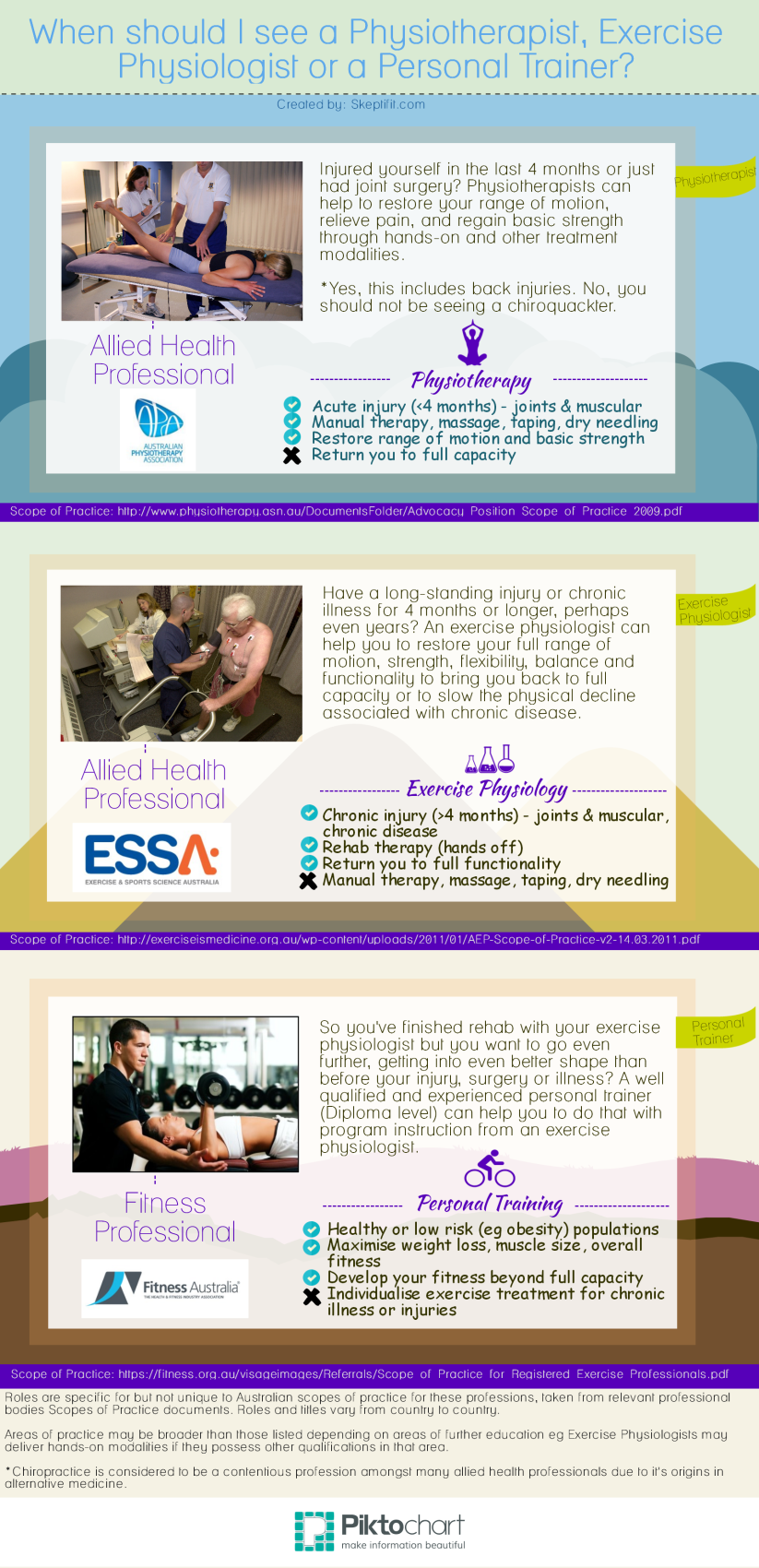
This infographic (my first ever!) delineates the difference between the three professions and their overlapping domains of practice.

This infographic (my first ever!) delineates the difference between the three professions and their overlapping domains of practice.
The Media Article
Back in August, Michelle Bridges, a personal trainer popularised by the Australian hit tv-series “The Biggest Loser“, came out with this article in the Sydney Morning Herald, on why personal trainers should stop calling fitness “fun”. Let me say straight up I’m inclined to agree with her, at least to an extent.
Her views are well balanced and seem to be in line with managing clients expectations about what exercise entails. While exercise certainly can be fun, particularly in the case of team sports and aerobics, activities such as high intensity training, sprinting, jogging, and weight lifting – all those that probably carry a majority of the benefits seen from exercise – probably aren’t best encapsulated with the noun “fun”.
My Thoughts
Challenging? Yes. Life altering? Yep. Healthy? Of course. Self-esteem building? You bet. But fun?
Ummm, no, no not really, not the first concept I would be using to introduce exercise to a newcomer. With that said I think it’s important to have an element of fun in all of the workouts we participate in, but to white-wash exercise in general as “fun” is definitely misleading for the average customer.
Now I’m neither a fan nor an opposition of Michelle Bridges, and I’ve probably seen a total of 10 accumulated minutes of The Biggest Loser over it’s entire duration, but I think it should be clear from her article that she’s targeting personal trainers who are using the “fun” concept as a way to draw in new customers, regardless of their expectations as to what exercise may actually entail. This could potentially destroy their motivation to exercise when they discover that it’s really not as fun as they were lead to believe.
The Plot Thickens with ESSA’s Response
Now to the crux of the matter. How did ESSA (Exercise & Sports Science Australia), the registration and organisational body for exercise physiologists and scientists respond to Michelle’s article via their Facebook page? Well yes, I’ll tell you because if you’ve read this far you’re probably keen to find out. The response was along the lines of:
“Dear Michelle, we here at ESSA believe that exercise is not only good for your health, but that it’s also fun!”
Isn’t that trite? A nice one sentence sound-byte for the masses. And why did I say “along the lines of” instead of quoting them directly? Well they removed their quoted response from their FB page after I criticised their reaction, though I assume it was still sent in some public form as a Tweet, article response or message to Michelle Bridges (My Googling skills failed me on this instance, sorry I can’t provide the exact phrasing).

A senior citizen while practicing his fitness exercise. Is this ‘exercise’, and is it ‘fun’? (Photo credit: Wikipedia)
This response came from the registration body who we’d hope have a better and more complex understanding of the issues surrounding the psychological and physiological complexities of exercise compared to the average professional provider, but nope, Michelle’s article was passively denegrated without truly understanding her message.
Tensions Between Personal Trainers and Exercise Physiologists
Why? I have a theory. I’ve noticed a lot of tension between personal trainers and exercise physiologists – if you’re in the field, tell me why you think I’m wrong. I’ve noticed two primary characteristics of the tension that exists between PT’s and EP’s:
These observations come from both my experience as a professional personal trainer and the views espoused by my lecturers and peers (eg ESSA) while studying exercise physiology. I won’t lie, I’ve denegrated personal trainers on countless occasions myself – the degree of appalling quality exercise delivery and outright commercialism for every fad exercise modality that comes to my attention is overwhelming, but there are certainly good PT’s out there who are experienced and know what they’re doing, they’re just hard to find.
I’m at a loss for a solution to this divide between the two professions, but I will say this – I was disappointed with ESSA’s trite response.
In Summary
Nobody’s perfect, but let’s be humble, and to the PT’s out there – let’s stop telling clients that “exercise is fun” and make more of an effort to manage their expectations. That doesn’t mean there can’t be fun aspects to exercise, nor does it mean we should torture clients in the way that Michelle Bridges does on TV, but let’s try to find a happy middle ground where benefits are seen while managing expectations and avoiding making exercise a chore.
Exercise should be for life, not for the term of the contract.
What are your thoughts? Should fitness be advertised as “fun”, or is the term overused?